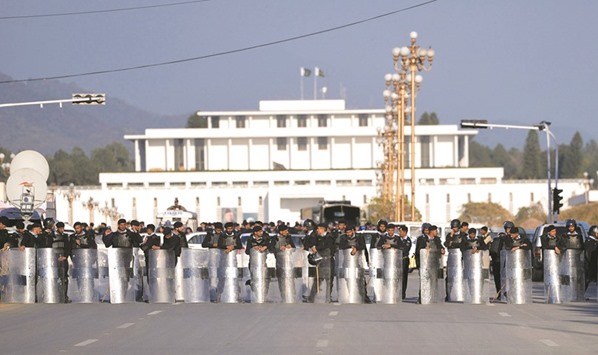Pakistan has welcomed Saudi Arabia’s initiative to form a military coalition of 34 countries to fight “terrorism” in the Islamic world.
The gesture came as Saudi Foreign Minister Adel bin Ahmed al-Jubeir met with Prime Minister Nawaz Sharif in Islamabad.
Riyadh announced the formation of the coalition last month signalling a more assertive foreign policy by the kingdom.
It said the alliance would share intelligence, combat violent ideology and deploy troops if necessary.
Saudi Arabia also leads a military coalition battling Iran-backed rebels in Yemen.
“Pakistan welcomes Saudi Arabia’s initiative and supports all such regional and international efforts to counter terrorism and extremism,” a foreign ministry statement quoted Sharif as saying.
Islamabad initially reacted cautiously to the announcement of the coalition, saying it was awaiting further details to decide the extent of its participation in different activities of the alliance.
“The prime minister affirmed that the people of Pakistan will always stand shoulder-to-shoulder with the people of Saudi Arabia against any threat to territorial integrity and sovereignty of Saudi Arabia,” said the statement.
Saudi Arabia has repeatedly denounced international “terrorism” and has itself seen an upsurge of attacks claimed by the Islamic State group over the past year, against minority Shias and members of the security forces.
Al-Jubeir briefed Sharif on the situation in Saudi’s relations with Iran, after Riyadh cut diplomatic ties following an arson attack on its embassy in Tehran.
“Pakistan expressed deep concern at the escalation of the situation and condemned the burning down of Saudi embassy in Tehran,” the statement said.
Sharif called for the “resolution of differences through peaceful means in the larger interest of the Muslim unity in this challenging time”.
The attack on the embassy was sparked by Saudi Arabia’s execution of Shia cleric Nimr al-Nimr.
The Saudi foreign minister also held delegation level talks with the prime minister’s
adviser Sartaj Aziz.
“The two sides underscored the need to develop jointly a counter narrative against extremism and terrorism with the help of religious scholars.”
It was agreed “both countries would make a concerted effort to promote multi-faceted co-operation and work together to defeat our common enemy—terrorism and extremism”.
The two sides also discussed ways and means to further expand areas of co-operation.
“Pakistan has shown a slight leaning towards Saudi Arabia by staying in the 34-nation alliance whose objectives are not very clear,” analyst Hasan Askari said.
“Pakistan has, however, kept some options open on how to deal with the situation of conflict with Iran and Saudi,” he said.
“It seems that now the Iranians will contact Pakistan to get certain clarifications after the Saudi foreign minister’s visit.”
Yesterday, hundreds of people joined a Shia-led protest in Islamabad against Pakistan’s decision to join Saudi Arabia’s 34-country coalition against extremism.
The protesters presented a memorandum to a foreign office spokesman demanding Pakistan drop out of the alliance.
In a separate rally in Islamabad, an estimated 1,500 people chanted slogans against the execution of Shia cleric Sheikh Nimr al-Nimr on January 2.
Pakistan is a majority Sunni country but 20% of the population are Shia.
Small scale rallies against the Saudi coalition were also organised in the eastern city of Lahore, while rival Sunni-led protests were held in Islamabad against Shia-majority Iran, with demonstrators accusing Tehran of “meddling” in Saudi Arabia’s internal affairs.

Riot policemen cordon off a street leading to President House during a protest rally in Islamabad yesterday.
